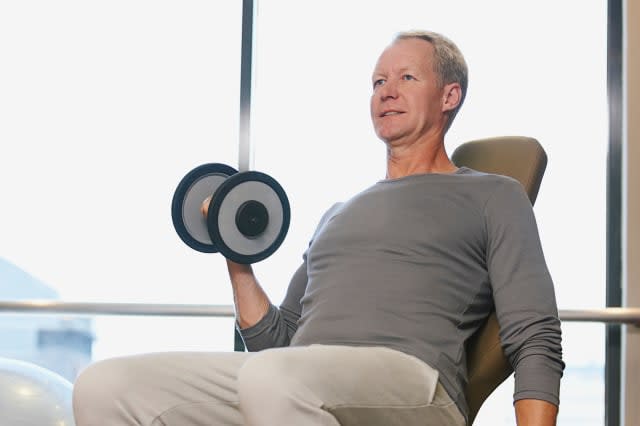How to combat age-related muscle loss

It's estimated that one-in-ten adults over the age of 50 suffer from age-related muscle loss – or sarcopenia to give the condition its medical name. While it can reduce your energy levels, affect your fitness, and even shorten your life expectancy, there are things you can do.
See also: Eight foods that fight aches and pain
See also: How diet affects arthritis
Why it happens
Sarcopenia is the medical term for muscle loss, from the Greek meaning 'vanishing flesh,' and is a natural part of ageing. When we lose muscle mass, it affects our strength and functional fitness, and can eventually make it hard to perform everyday tasks, such as carrying shopping and climbing the stairs.
It can start from the age of 40 onwards, and the process speeds up dramatically after the age of 60, doubling from 0.5% per year to 1%, then 2% at age 70, and 4% at the age of 80.
The problem is widespread, in part due to many people having a sedentary lifestyle. It's estimated that a third of people in care homes may have sarcopenia, increasingly the risk of frailty and falls. It's also an issue that's getting worse. Experts predict that 63 per cent more pensioners could suffer from sarcopenia by 2045 – with women more affected than men.
How muscle loss changes as you get older
Once your muscle begins to waste from lack of use, fat moves in. Because the process is very slow to start with, it may take 10 years or so before you notice that your physique has changed. Unfortunately, once the fat has moved in, it's very difficult to get rid of it.
To make matters worse, your metabolism slows the less muscle you have – and when you burn fewer calories, you're likely to gain weight. As well as affecting how you look, having weak muscles can make it harder to balance, reduce your reaction times, and lead to a drop in energy. The problem is a vicious circle – the more tired you feel, the less you'll feel like exercising, and the more your muscles waste.
Symptoms to watch for
Symptoms of sarcopenia including feeling physically weaker, particularly over time, finding it harder to lift everyday things, walking more slowly, and tiring more easily. Losing weight without trying can also be a sign of sarcopenia. As these can be symptoms of other things, it's important to see your GP.
What you can do
While some age-related deterioration of your muscles is inevitable, the good news is that eating a healthy diet and exercising regularly can slow down and even reverse the condition.
Resistance training – such as lifting weights, pulling against resistance bands or moving part of the body against gravity – is the best form of exercise to keep your muscles healthy and strong.
One study of 57 adults aged 65–94 showed that performing resistance exercises three times per week increased muscle strength over 12 weeks.
It's never too late to start, either. A separate study from the Center on Aging at Tufts University, Boston, found that people in their 70s, 80s and 90s were able to double their muscle strength during a 10-week training period.
It's important to do aerobic exercise too – like brisk walking, swimming, or jogging. A study of 879 adults over age 60 found that faster walkers were less likely to have sarcopenia. Just remember that you need to combine it with resistance training for best effects.
Change your diet
What you eat can also make a difference. To help prevent sarcopenia, experts recommend eating 25–30 grams of protein (such as chicken, eggs, cottage cheese or lentils) at each meal. You also need to make sure you're getting enough calories generally. One way to boost your calorie intake and get more protein is to drinking whey protein shakes.
Studies show that people with long-term inflammation tend to have decreased muscle mass. Many diseases can cause long-term inflammation, including rheumatoid arthritis, Crohn's disease, ulcerative colitis, lupus, and tuberculosis.
Eating anti-inflammatory foods, such as turmeric and oily fish can help. One study found that women who did resistance training and took a 2-gram fish oil supplement each day had increased muscle strength compared to those who didn't take the supplement.
Studies have shown that Vitamin D deficiency is related to sarcopenia, so it's worth taking a vitamin D supplement if you don't get enough sunshine, particularly in the winter months.



